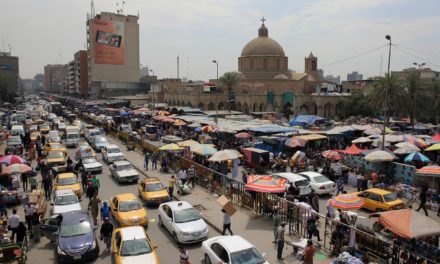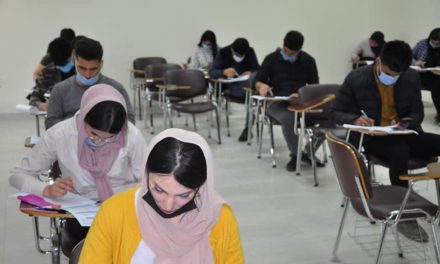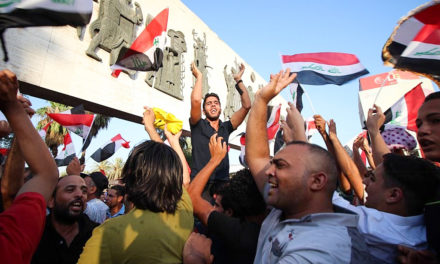As a democratizing state that has been plagued with civil war and non-state terrorism, Iraq has had to carefully protect itself as a state as well as simultaneously ensure its institutions continue to mature democratically. One of the most sensitive and difficult aspects of democracy to protect and grow is freedom of speech. In Iraq’s case, with all the violence and presence of militant groups, this remains a challenge and has become an even bigger one after the 2018 general election.
One of the biggest challenges that Iraq is facing is that few of the political parties in Iraq, particularly those with armed wings or militant groups associated with them, appear to be believers in democracy. While these political parties may partake in elections and in the world of journalism through their own news websites and television channels, they do not embrace the ideas and practices that make a democracy, such as the concept of freedom of speech, the right to free assembly and rule of law. Iraq had its fair share of politically motivated kidnappings, killings and party HQ attacks in the past, but now there is a fear that this can return with the empowerment of certain political parties winning seats in the recent election.
What is more unfortunate is that many political experts and those who work in media are starting to polish the image of those parties, and they are doing that for no other reason than the fact that they see these parties as a bulwark to Iranian influence in Iraq. Take Muqtada Al-Sadr whose coalition just won 54 seats in parliament, the most out of any party. Sadr is being rebranded as a reformer, populist, and nationalist anti-corruption crusader. Sadr’s history as a notorious militia leader who oversaw the killing of thousands of Iraqi civilians and servicemen is being brushed aside.
In the past, Sadr and his loyalists have used state resources at their disposal to support rogue elements like running death squads out of ambulances when the Ministry of Health was under their watch. Despite that the crimes of Sadr remain fresh in the memories of Iraqis, his loyal fan base that remains at a constant level of support pulled through for Muqtada Al-Sadr on election day. The roughly 1.5 million votes the Sadrists received in 2018 produced more seats in parliament than that same number of voters in 2014.
Sadr has pushed an anti-Iran narrative that has some Iraqis and Western analysts fearful of Iran excited to counter Iranian influence in the region. However, no one should allow their blind fear of Iran to distract them from the ultimate goal of allowing Iraq to democratize and not sacrifice the process midway because undemocratic figures offered to counter Iranian influence.
It is important to look at the Kurdistan Democratic Party that won 25 seats. They too have run an anti-Iran campaign in the past and received tremendous Western support because of it. However, they too have shown a lack of sympathy towards democratic principles and have used their armed forces against groups and individuals that have spoken out against them. Candidates running under the New Generation party for the Iraqi parliament were beaten multiple times by KDP sympathizers or under the watch of the KDP—simply because they dared to challenge the KDP. Freedom of speech is not respected in the Kurdistan Region of Iraq and the West ignored this in their support in return for political cooperation. That political cooperation has become nonexistent in recent months after disagreement over the Kurdish referendum held in September 2017 and as a result, there is a strong possibility the KDP will turn towards the Iranians for support and base their political alliances in Baghdad.
The lesson with the KDP is that supporting certain groups with short-term goals of political cooperation or having anti-Iranian sentiment is foolish. Not only is it not lasting, it can easily be reversed. Especially in the case of Muqtada Al-Sadr who has a past with Iran from receiving arms during the American occupation or finding refuge in Iran after his militia was defeated a decade ago.
Other groups that won significant seats in parliament are the Fateh Alliance and the Patriotic Union of Kurdistan. Both groups have significant armed presence in the country as the PUK has recently used their militants to attack protesters in Sulaymaniyah. The danger with Fateh now that the war with ISIS is over and they become more involved in the political process, they have the potential to misuse their influence over armed groups in Iraq. This puts added pressure on the Iraqi state to continue its strategy of bringing in armed groups under the state’s supervision or de-arming them completely.
Regardless of their political stance towards Iran, the threat of political actors with armed groups is the same, which is why one must not lose sight of what is truly important and that is Iraq’s democratization. While you cannot change the results of the election, you can put pressure on elected officials to respect the rule of law, the fundamentals of democracy and support the elected officials that have these interests at heart to play an integral role in the new government as it will require multiple parties to come together and form a coalition to obtain a majority.

Hamzeh Hadad
Hamzeh Hadad is an Iraqi writer and commentator. He is currently a Master of Arts candidate at the Norman Paterson School of International Affairs.










